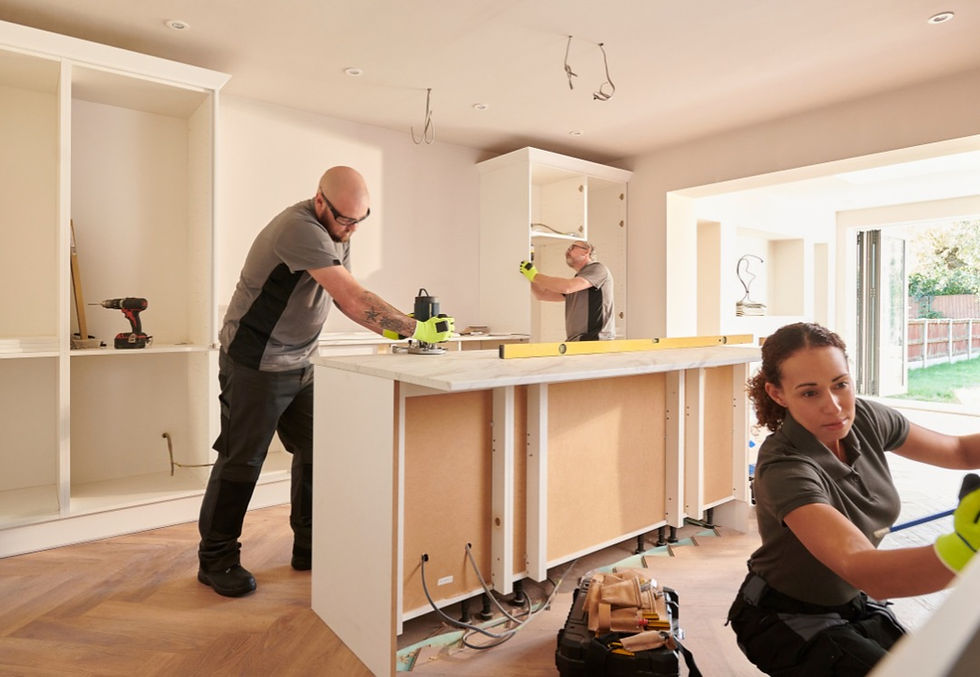A new way to think about your English level
- Rhiannon Carter

- Nov 15, 2023
- 6 min read
Updated: Nov 16, 2023
Let me share a new metaphor with you today...
I want you to think about your skills in English like the skills of carpentry:

Let's ignore for now how much scrolling it took to find a woman in that selection of stock images 🙄
Level 1: Your English is a shelf
To flesh the idea out a little, let's imagine that your everyday English - your simple past conjugations, your top 3,000 words, basic question structures (or, failing that, a rising intonation and a questioning facial expression) - is the equivalent of being able to handle a hand saw, hammer in some nails, use a basic drill, and maybe find some sandpaper to smooth down the edges.
Congratulations, you've put up your first shelf!
translation: you've gone on holiday and ordered your dinner correctly every night. Huzzah!
Now, you're feeling confident with the basics: A friend asks you to help them put up a shelf in their house and you say, "I've only done it a couple of times. I'm no expert! But as long as you're OK with it not being perfect, I'd be happy to help."

Level 2: Your English is a Shed
And then the situation changes: you decide to assemble a shed in your back garden.
In theory, same skills, right?
The shed even comes pre-cut. You've just got to stick it together!
But the scale makes a difference. You're dealing with larger sections of wood, the construction is three-dimensional, and you also need to grapple with the ground itself, making sure it's level and suitable for having a shed on top. There's also staining and waterproofing and fixing hinges and locks and installing simple windows.
It doesn't need to be perfect - it's just a shed. But to get it looking vaguely shed-like, you need more effort and a few more skills than when you were putting up shelves.
This is perhaps the equivalent of your first few months in an English-speaking country, or starting a job where you need to use English in some meetings.
It's exhausting, for one thing - much more tiring than you anticipated. And you're beginning to need more complex language: your pronunciation needs to be clear over longer periods of speech, not just short sentences; you need some specialist vocabulary you never learned in school; you need to start moving fluently between verb forms within a conversation.
It doesn't need to be excellent. No one expects you to be fluent. Things still confuse you. But you find yourself with a level of flexibility you haven't had a need for before.

Level 3: Your English is a Kitchen
OK, sh*t's getting serious with this next level.
(Thanks for humouring me with this beleaguered metaphor, by the way. I promise I'll draw a conclusion soon!)
You want to install your own kitchen. How hard can it be!?
Now, accuracy is important. Your kitchen cabinets shouldn't really be wonky, after all. You're also going to need power tools: a table-saw to get the countertop joint perfectly straight; a jigsaw to work around any lumps and bumps in your wall. The skills you need multiply: you're dealing with a gas supply for your oven, and water pipes for your dishwasher, and drain pipes for your sink.
Is there room for error? Yes, of course.
Your tiling is a little uneven? It adds to the charm!
You end up going through 3 door fronts because you drill the handle holes in the wrong place every time? Still cheaper than getting a professional!
The final cutout for the cooker isn't quite square? Who cares? Who else can say they fitted their own kitchen!?
But there's no denying that this is a step up from the previous shed-building adventure.
This is the equivalent of finding yourself in a long-term, immersive English-speaking environment: your whole career in international companies where English is the working language; living in Ireland for 20 years; reading complex, literary novels on a regular basis.
You build up a level of linguistic skill where you can more or less handle every situation. You have a really wide range of vocabulary and grammatical structures to hand. You don't always use them all (that's not necessary!) but if the situation requires it, you have no trouble accessing the language you need.
You have experienced a broad range of contexts and it's rare for you to find yourself in a completely new situation. You feel comfortable doing almost everything in English and, if you do wobble, it doesn't take you long to get your bearings again.
Are you perfect!? No.
And you don't need to be, generally speaking. Some things - presentations, job interviews, difficult conversations with your child's teacher - might need a little more concentration. You may even do some preparation beforehand to build your confidence (like watching a YouTube video before installing the sink). But this is unusual.
Your English is (probably) good enough
The reality is, the vast, vast, vast majority of English learners will only ever need enough skills to - metaphorically speaking - put up a shelf.
This is probably about an A2 level of English.
You might want to feel more confident putting up the shelf. You might want some more practice putting up a shelf. But putting up shelves is all you'll ever need to do.
If you only ever use English for travelling - and you always travel with other people who speak your language to keep you company - this is probably all you need.
And the metaphor keeps going - if you need help putting up shelves, you can call a professional - Google Translate, Chat GPT, online dictionaries... they can all help you make up for the skills you don't have.
The next big group of learners will only ever need shed-level skills in English.
This is probably about B2, in the CEFR.
It's a little bit rough around the edges, and it definitely has its limitations, but nine times out of ten, it gets the job done. (And in the times it doesn't, Google Translate is right there, on your phone!)
In the areas of your life where you use English regularly, the chances are that you're going to get really good. It's like building 50 sheds - by the end, those sheds are going to be niiiiice.
But your context is limited and you don't have much need to develop your skills in other areas. This isn't a problem, it's just the way it is. You don't need to install a kitchen, so why learn about plumbing or get your gas certification?
Finally, a very, very small number of people will want to install a kitchen with their English.
Most sensible people would call in a professional at this point.
Professionals do it more quickly, to a higher standard, and will sweep up after themselves, leaving you to move your plates and saucepans back in by Friday.
Learning how to install a kitchen is time-consuming. Learning English to a C1/C2 level takes years, often decades. It's only really worth it if you're going to install lots and lots of kitchens (or, at least, live in and appreciate your kitchen for years to come).
If you need this level of English, then it's worth the stress. If you work in English 24/7, if you have high-stakes situations that require advanced English like a marriage or leading a team, then yes, you probably need this.
Worldwide, the number of these people is small.
What level do you need?
This is the conclusion of this laboured metaphor: what do you need? how much effort are you prepared to put into acquiring the skills?
Given that I've worked in English language education for my whole working life, and given that I currently work with very high-level users of English, it may be surprising that this is my message: you probably don't need any more English than you already have.
Be honest with yourself:
Do I really need to reach a C1 level? A C2 level?
Would my time be better spent developing an entirely different skill?
Can this metaphor help me feel more comfortable and satisfied with my B2/shed-building level of English?

There is a final, even teenier, group of people...
These are the master craftsmen of language.
These are the people who love language and are happy - no, excited - to accept a life of constant learning in order to hone their craft.
These people revel in good wordplay, in finding just the right turn of phrase. They are poets and artists in English. They study grammar in great depth to understand the subtle shifts in meaning that 99% of users - native and non-native alike - are unaware of.
An unfortunate, but avoidable, side-effect of this depth of caring is a high level of perfectionism. These people are often reluctant to accept that the reality of their language use will fall short of their ideals.
For these people, learning how to balance their passion for language with the reality of imperfect use is incredibly important. Those two ideas are not contradictory; they necessarily sit alongside each other.
I would suggest that, if you think you sit in this final category, you should think again. Think carefully.
Are you sure this is what you need or want?
Are you putting unnecessary pressure on yourself because someone told you once that "mastery" was the only destination available?
And if you DO fit in this category, are you allowing that focus on mastery to negatively impact your everyday experience of using English? How can you change that?
Some food for thought...
Leave a comment and tell me if you're Team Shelf, Team Shed or Team Kitchen! (or, if you must, Team Master Craftsman 😅)
To end this post today, let me show you my "kitchen" when we first bought our flat and, hopefully, explain why this metaphor felt so dang powerful for me!

Terrifying, isn't it? 😱




Comments